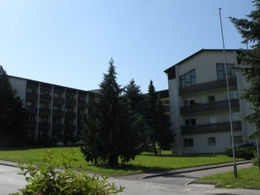Bezirksalten- und Pflegeheim
Gaspoltshofen, Oberösterreich, Österreich
History: On the occasion of the 60th anniversary of Emperor Franz Josef's reign in 1908, the municipal administration under Mayor Erasmus Bürstinger decided to build a poorhouse. The Tertiary Sisters already working in Gaspoltshofen were to manage and look after the home. Dean Meingassner provided the community with a building plot near the monastery free of charge. This donation was also approved by the episcopal ordinariate in 1909. Soon afterwards, however, differences arose between the community and the tertiary sisters over the management of the house. The start of construction was delayed until the parish believed that it could do without the poorhouse, as it believed that the Baldinger Foundation (convent) would have to take in the elderly and sick anyway. The poorhouse (Gaspoltshofen No. 45) was nevertheless built in 1911. In 1960, the municipality acquired this building, known as "Josefsheim", from the church and attached it to the existing old people's home. Extensive adaptation and renovation work was carried out between 1962 and 1964. The home was reopened on 4 October 1964. When the Sisters of St Mary left Gaspoltshofen in 1972, the situation changed fundamentally. The district decided to build a new building. The Schlömerfeld was chosen as the building site. Father Stelzhammer had acquired this plot in 1917 by selling meadows in Weinberg and gardens in Gaspoltshofen for the purpose of relocating the cemetery. Construction work began on 19 March 1974. The plans included 65 residential and 34 nursing places as well as staff rooms, a caretaker's flat and a caretaker's flat. The construction costs totalled 50 million schillings.
Construction of the new district old people's and nursing home: The ground-breaking ceremony for the new district old people's and nursing home took place in July 2009. The planned move into the new building is 2011/2012.
The subsequent utilisation of the existing building has been taken care of. Residential units for "assisted living" and numerous other possible uses are planned.
More information at: baph.gaspoltshofen@shvgr.at
Construction of the new district old people's and nursing home: The ground-breaking ceremony for the new district old people's and nursing home took place in July 2009. The planned move into the new building is 2011/2012.
The subsequent utilisation of the existing building has been taken care of. Residential units for "assisted living" and numerous other possible uses are planned.
More information at: baph.gaspoltshofen@shvgr.at
4673 Gaspoltshofen
Phone +43 7735 6561 - 0
E-Mail baph.gaspoltshofen@shvgr.at
Contact person
Bezirksalten- und Pflegeheim
Please get in touch for more information.
powered by TOURDATA


